Narrator C: Dawn on the third day. On a high ridge on the Confederate Army’s side . . .
James Longstreet: Look, General Lee, at what lies between us and the Yankees—the steep hills, the rows of artillery, the fences. Our men will have to charge over nearly a mile of open ground under the rain of their gunfire.
Lee: The enemy is there, General, and I am going to strike him!
Narrator D: Later that morning, on the Union side . . .
Frank A. Haskell: Eleven o’clock, and no sound of gunfire anywhere.
John Gibbon: Well, I say it’s a good time for a bite to eat!
Narrator E: The officers eat, then lie back in the sun. Suddenly, there is a loud noise.
Haskell: What was that?
Cal: Look, over there! Smoke from guns and cannon, everywhere!
Haskell: Those Rebels are pouring all their might on us!
Gibbon (grabbing his sword): To arms! To arms! Boy, get my horse!
Narrator A: A boy runs to Gibbon’s horse. But as the boy takes the reins and climbs on, a musket ball tears into his chest. He falls dead.
Narrator B: For almost two hours nonstop, Lee’s cannon pound the Union’s defenses. Meade’s men blast back. The sound is terrifying.
Clyde: Matty, I’m hit!
Matty: Your . . . leg! It’s gone!
Clyde (slowly, painfully): Don’t cry, Matty. Just tell my ma I was brave to the end. (He dies.)
Narrator C: Suddenly, silence falls. Both sides have ceased firing. But before the shock can fade . . .
George E. Pickett (shouting): Up, men! Up! Don’t forget today that you are from old Virginia! Charge!
Narrator D: Screaming their blood-curdling Rebel yell, about 15,000 gray-coated soldiers pour across the open fields toward the Union lines. But the Union troops up on Cemetery Ridge have a clear view of the attack—and are ready.
Gibbon (riding among his men): Do not hurry, men. Don’t fire too fast. Let them get close before you fire, and then aim low and steady.
Narrator E: Confederates are cut down by Union gunfire. Barely half of them survive death or capture. By nightfall, the battle is over.


